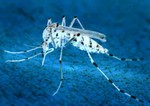1- REMINDER OF FACTS
The biocide Cerathrine® (a mixture of deltamethrin and esbiothrin) from the pyrethroid family (1) was sprayed on September 18, 20, 21, and 23 in a neighborhood of the city of Nice. This treatment was carried out by technicians from the Interdepartmental Mediterranean Mosquito Control Agreement (EID), a private organization, following a prefectural decree and delegation given by the Nice Town Hall.
The treated neighborhood is where one/two people were reported as victims of tiger mosquito bites leading to the allergy known as “dengue.” A psychosis spread among citizens and to prevent anyone from using any pesticides, the Prefect of Alpes-Maritimes, as permitted by law, issued a decree to “legalize” a collective and appropriate spraying.
2- INTRODUCTION
The chemical products chosen are very dangerous for health and the environment. If it turns out that the danger of contamination was real, we can accept this treatment in essence but not in form. Already, we could challenge the timing of the application because the presence of the biocide “Esbiothrine” in the applied mixture should allow nighttime application.
It is true that this product is not authorized in agriculture, but this is not a “pesticide” spraying subject to the directive of the Ministry of Agriculture, but a “biocide” (2) directive under the Ministry of Ecology and the Ministry of Health.
3- PREFECTORAL DECISION
In 2006 and 2007, the Ministries of Health, Agriculture, and Ecology issued an interministerial circular (3) DGS/RI1/DGAL/DNP no 2007-294 of July 20, 2007, regarding measures to limit the circulation of the West Nile virus (following mosquito bites).
This document outlines the measures (methods of application and the chemistry of the products) aimed at limiting the circulation of the West Nile virus in mainland France. These measures have a limited application time frame, generally one month.
4- APPROVAL of Esbiothrine contained in the applied mixture
“Esbiothrine” is recognized by the American EPA as having “suggestive evidence of carcinogenicity” and is not authorized to be used as a pesticide agent by the Ministry of Agriculture. Nonetheless, it is authorized by the ‘biocidal directive’ as an “adulticide.”
In Annex VII of this ministerial circular (2007 edition), it mentions that: “… The products currently available on the market are not subject to approval, in the same way as for larvicides. Due to their too low selectivity and the risks to non-target fauna (fish, pollinating insects), they can only be used in urban or peri-urban areas and, in no case directly in natural environments…”
5- APPROVAL of Deltamethrin contained in the applied mixture
Deltamethrin is recognized as an endocrine disruptor of category 1 U E. Nonetheless, it is authorized to be spread in our countryside by the pesticide directive and in our cities by the biocide directive (Indeed the biocide directive does not prohibit it, and therefore everything that is not prohibited is allowed). There are dozens of pesticide inputs based on deltamethrin, among which we can cite the one commercialized by Bayer Crop Science France (4). Commercial Name: K-OHRINE Authorization Number for AMM: 7800649
6 – CONCLUSION
The MDRGF (Movement for Rights and Respect of Future Generations) is fully aware that in the summer of 2010, there was an explosion in the number of tiger mosquitoes causing nuisances. It seems that this multiplication of insects had been anticipated but not communicated to the citizens. A more preventive approach could have helped/contributed to reducing this multiplication (biological control (BT), use of natural products, or simply by cleaning the stagnant waters).
Of course, the companies involved in the treatment of invasive insects with pesticides have taken advantage of this situation to offer their services without considering the use of biological products or appropriate treatments to limit harmful effects on health, the environment, and biodiversity.
It seems that it was the Prefect’s services that decided on the implementation of this mosquito control, but did they have enough knowledge about the harmful effects of this treatment, or did they let the companies decide on the choice of products?
Thanks to the initiative of the MDRGF, which organizes “Pesticide-Free Week” every year, the city of Nice has joined our fight by declaring Nice a “Zero Pesticide City.”
What should citizens then think of this return of decision? Should we consider as obsolete the information on the sign at the start of the Promenade des Anglais stating that the city of Nice is “zero pesticide”?
What was the position of CG06 on this intervention?
The intervention of Mr. E. Ciotti at the National Assembly showed us his willingness to consider health and environmental issues, but what about today?
Question published in the Official Journal on 08/06/2010
Mr. Éric Ciotti draws Mr. Minister of Food, Agriculture and Fisheries’ attention to the recommendation formulated in the report “Pesticides and Health” by Messrs. Jean-Claude Etienne, senator, and Claude Gatignol, deputy, made on behalf of the Parliamentary Office for Scientific and Technological Choices Evaluation on April 29, 2010, which aims to develop, to truly reduce the massive use of pesticides, an environmental pressure indicator measuring the quantities of active substances used and not just an environmental impact indicator measuring the amounts of pesticides present in the environment and in the plants we consume. He asks him to kindly indicate his opinion on this proposal.
The past surprise and media effect lead us to say that there was a before and there will surely be an after mosquito control. So what actions are planned to prevent the proliferation of this scourge?
Will the competent authorities implement a real prevention policy to eliminate larvae?
Will the competent authorities open a debate to consider the practical experience and communication tools of associations and NGOs?
If such a desire for collaboration were established in the region, the MDRGF association is ready to bring all its experience.
Angelo Sanfilippo, delegated by the MDRGF to the CPCB working group (Chemical Products and Biocide Commission) at the Ministry of Ecology and Sustainable Development www.mdrgf.fr/mdrgf2@wanadoo.fr


